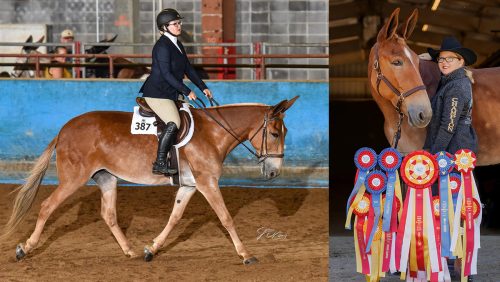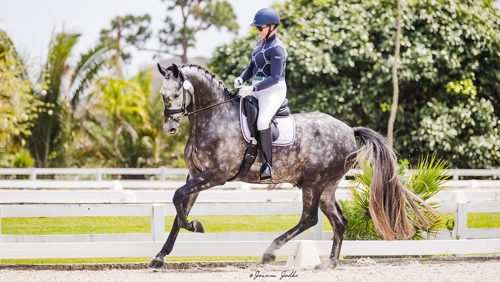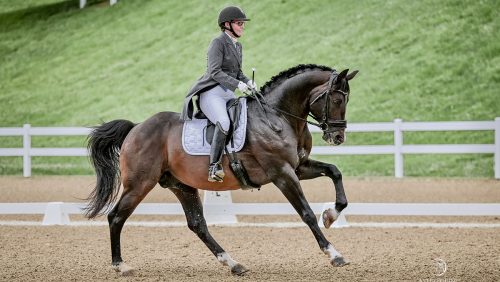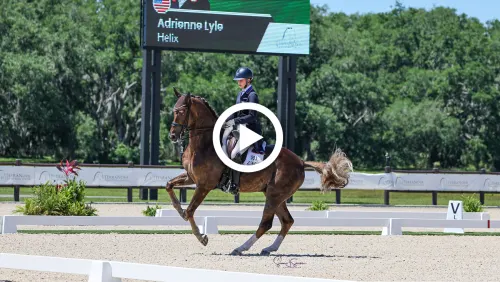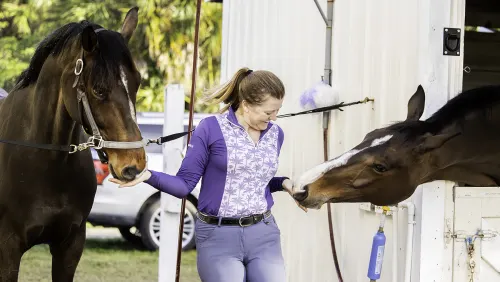In this series, the Chronicle follows seven riders as they seek to fulfill their Olympic dreams in London in 2012.
Heather Blitz and Paragon’s scores (67.93 percent in the first Grand Prix, 70.00 percent in the first Olympic Grand Prix Special, 72.48 percent in the second Grand Prix and 71.11 percent in the second Olympic Grand Prix Special) in the U.S. Equestrian Federation Dressage Festival Of Champions National Grand Prix Championship, also the selection trials for the 2012 Olympic Games team, earned them sixth place overall. They were originally placed seventh on the Fédération Equestre Internationale nominated entry. When first alternate Todd Flettrich opted to retire Otto instead of sending him to London, Blitz and Paragon were named first team alternates, pending approval from the USEF High Performance Working Group and the USEF Executive Committee. Paragon will travel to Great Britain on July 9 with the other team horses.
Leading up to the selection trials [held June 9-10 and 15-16, in Gladstone, N.J.], I didn’t do any competitions. I was just training at home. I got to New Jersey about a week ahead of time to work on some things. It’s a long trip, and traveling on the road is strenuous on any horse.
We tried to break it up and make it easier, but you can’t get around the fact that it’s 24 hours of driving [from Wellington, Fla.]. I would have flown if I could have, but there are no direct flights.
To do that much travel and then have to compete at the best you can is a challenge. In hindsight, I should have been there maybe two weeks ahead of time. He didn’t have quite as much power as what I had at home.
I touched on a little bit of everything in the training when we got to New Jersey. I tried to work him as little as possible but as much as necessary to get him to rest well.
There was such a contrast between the climate when we left Florida and when we got to New Jersey. In Florida we were dealing with heat indexes of 95, and had been since March, and in New Jersey it was in the 40s at night. His body was tired from the traveling, but he felt the coolness and was very ready to work.
It was a little challenging. I wanted his body to rest, but he was kicking and squealing and rearing in his stall, so I had to do something with him. I started working him right from the beginning, and he got better as the days went on.
“It Would Have Been Miraculous”
I wasn’t very happy with myself after the first Grand Prix. He maybe had a little bit less of a good feeling in himself, and I don’t know if I dealt with it the way I should have.
He didn’t feel like his best in warm-up, and I knew he was struggling with some connection issues. You can’t help but have a little bit of panic set in when you feel something not as you’d like it to be at something as important as an Olympic selection trials. I probably just pushed a bit more when I should have given him a second more time. I feel like I didn’t handle what his issues were that day as well as I could have.
But we still had a lot of really nice things in that test. His extensions were very good and rhythmic—both the trot and canter extensions. I thought those were really top-notch. The flying changes, the twos and ones, I thought were very good—clean and straight and as brilliant as always. I kept him a little more collected during the tempis, and some judges like that better, and some judges want him to cover the whole diagonal like he can.
I had a lot of brilliant moments in the test, but then when we came to the piaffe we got out of sync. I wasn’t really there for him, and he wasn’t really there for me. The transitions were not smooth, and we got a lot of points taken off.
The Special the next day was definitely better. The score I got in the first Grand Prix was low enough compared to some scores above me that, in a way, I already had to deal with feeling like there was a very small chance for me to make the team. I would have had to do sort of miracle riding to get back up to what the top four were doing.
ADVERTISEMENT
So I could come back the next day and go back to riding without the external stress of thinking about making the team. Immediately that put me in a better state of mind, and it put him in a better state of mind. We went through that test in a much different way—much more like we are normally.
In the second test, I rode him a lot more like he’s my horse and nobody else’s. It worked out better, and we had very good communication on all the piaffe and passage work. He did it all and didn’t miss a single beat in the transitions. It may not have been his most powerful piaffe and passage, but it was good. We went back to the stable in a much better state of mind, and I felt like it was a good experience for him.
The extensions were all good both weekends. I was really happy with his trot extensions; they’re so flamboyant and expressive, but they also had a very mature feeling both weekends, and he stayed very on the aids. Sometimes he loses a little rhythm if he overdoes it, but that didn’t happen.
All four canter extensions in the trials, I think he should have gotten 12s if you ask me—1 point for each stride he takes across the diagonal. He takes such a big stride and is really pushing from behind, and the transition back is so easy.
I also liked his canter zigzags. The pirouettes are a work in progress, but they were all mistake-free. It was a good step in the right direction.
I think each test got better as it went, so I would say the Saturday of the second weekend—the second Olympic Special—was our best test.
Watch the Grand Prix from the second weekend.
I never really get the sense that he’s aware of the show ring being different than the warm-up ring. I think it’s more a matter of my mindset and what I expect. He’s very focused on me. He’s not afraid of me, and he’s not really worried about what I want, but he really listens.
After the fourth test, or during the fourth test, I was the most at home out there in my own mind. The expectations of the Olympics looming two months ahead in the future weren’t in my head anymore. I realized it was not really a possibility for me.
After the first weekend, it took me two or three days to get over that. On one hand, it was a huge amount of disappointment that I was feeling those three days. But, on the other hand, it was amazing the amount of pressure that lifted off of me once I accepted that it was going to go another way. I came into Gladstone with maybe a little too much expectation, and that’s never a good thing. You have to think positively, but there were a little too many expectations, both from myself and from people around me.
It’s the horse’s first year at Grand Prix, and he’s only done six shows. It’s crazy to think any horse could do it—no matter how talented they are. It just would have been miraculous had it happened, but the second weekend I was riding another show, and I enjoyed the second weekend way more than the first.
I spent the days in between not getting help from anyone, and I had really quiet rides by myself and worked on small details, and then I just put him in the ring. Going through the test isn’t nearly as hard as the preparation. I didn’t even think about the test when I was training.
An Alternate Ending
ADVERTISEMENT
I guess it didn’t really occur to me that we would be the alternates until I thought about Todd’s position. When he first approached me with what he was thinking, it was a surprise, but it made sense. He took a day to make his official decision, and that gave me a day to make my official decision.
To go as an alternate is going to be emotionally difficult. I have one foot in the door, and then my other foot isn’t in the door. You have to be ready to step up but also ready to head back once they don’t need you. There’s an emotional commitment, but as soon as the jog is over, I go home. I don’t even go to the venue. I don’t get tickets to the event. You go as a utility thing for the team, and you’re there for them.
But I just came up with a number of reasons it was worth it to do it. I have to have a real plan in my mind how I’m going to organize it in my head to fill both of those roles. I kind of have to be two people at the same time, and I’ve never done that before. A lot of riders don’t want to be the alternate because it’s not so easy.
There are positives. We get to basically make it sort of like a trial run. We’re fortunate that the U.S. Equestrian Team Foundation pays for the travel on the horses and riders and the housing. It’s like an expenses-paid trip for us to go and train with the team and be in the atmosphere. I can practice how it’ll be to have the stress on me.
It’s also to expose him a little bit in Europe. I had him there with me as a young horse, but when I came back to the States he was 6, and I’d done just two little 6-year-old qualifying shows with him there. I’m going to do the Hickstead show [July 18-21 in Great Britain], and that’s a big reason to go over.
If they do need a reserve horse, I think he’s the best one for that. If he has to move up, I feel like we’re capable of going up centerline. We can definitely do it, and I’d feel confident and proud. Those are the main reasons—some for my benefit and some for the team’s. It’s never happened before that an alternate has had to take a spot on the team, but I would be there for them if they needed that.
Before we leave he’ll have a couple weeks of just lighter work. I can’t give him too much time off, because he’s really fit. I’m not turning him out right now because of safety reasons and because of the different terrain here, and he’s used to turnout. So I can’t let him stay in a stall all day. He gets handwalked three or four times a day.
I’m working on my own, though I could get help if I needed. We’ll work some of the days on collection, some on pirouettes, some on changes, but I won’t really put the pedal to the metal, so to speak, until we get over there.
Fast Facts About Heather Blitz
Age: 43
Hometown: Wellington, Fla.
Olympic Contender: Paragon, 9-year-old Danish Warmblood gelding (Blue Hors Don Schufro—Pari Lord, Loran), owned by Blitz and bred by Oak Hill Ranch.
Competition Highlights:
- Team gold, Pan American Games (Mexico) (2011)
- Individual silver, Pan American Games (Mexico) (2011)
- 1st place Grand Prix freestyle, WEF Dressage Classic (Fla.) (2012)
- 2nd place Intermediaire I Championship, Collecting Gaits Farm/USEF National Dressage Festival Of Champions (N.J.) (2011)
- 2nd place Olympic Grand Prix Special, World Dressage Masters Palm Beach CDI**** (Fla.) (2012)
- 3rd place Olympic Grand Prix Special, Florida Dressage Classic CDI-W (2012)
- 6th place USEF Dressage Festival Of Champions National Grand Prix Championship (N.J.) (2012)







